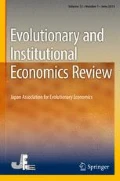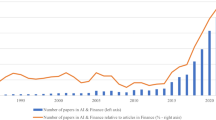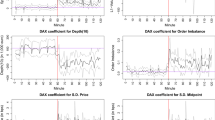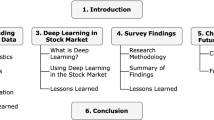Abstract
Since the subprime mortgage crisis in the United Sates, stock markets around the world have crashed, revealing their instability. To stem the decline in stock prices, short-selling regulations have been implemented in many markets. However, their effectiveness remains unclear. In this paper, we discuss the effectiveness of short-selling regulation using artificial markets which is an agent-based model of financial markets. We indicate that the short-term regulation contributes to the market stability because of the prevention of the decline in stock price but the long-term regulation inhibits it because of bubbles emergence. First, we constructed an artificial market that allows short-selling and an artificial market with short-selling regulation and have observed the stock prices in both of these markets. We found that the market in which short-selling was allowed was more stable than the market with short-selling regulation, and bubbles emerged in the regulated market. Next, we evaluated the values of assets of agents who used three trading strategies, specifically, these agents were fundamentalists, chartists, and noise traders. The fundamentalists had the best performance among the three types of agents. Finally, we compared the price variation in the market in which short-selling was regulated with that in which it was not regulated after markets satisfied a regulation condition. Thus, we confirmed that the former rebounded faster than the latter.
Similar content being viewed by others
References
Arthur, W., J. Holland, B. LeBaron, R. Palmer and P. Tayler (1997) “Asset pricing under endogenous expectations in an artificial stock market,” The Economy as an Evolving Complex System II, Addison-Wesley.
Bris, A., W. N. Goetzmann, and N. Zhu (2004) “Efficiency and the bear: short sales and markets around the world,” Yale ICF Working Paper No. 02-45.
Chen, S.-H. and C.-H. Yeh (2002) “On the emergent properties of artificial stock markets: the efficient market hypothesis and the rational expectations hypothesis,” Journal of Economic Behavior & Organization 49.2: 217–239.
Darley, V. and A. V. Outkin (2007) A NASDAQ Market Simulation: Insights on a Major Market from the Science of Complex Adaptive Systems, World Scientific Publication Co. Inc.
De Long, J. B., A. Shleifer, L. Summers and R. Waldmann (1990) “Noise Trader Risk in Financial Markets,” Journal of Political Economy, 68.4: 703–738.
Hara, A. and T. Nagao (2002) “Construction and analysis of stock markets model using ADG; automatically defined groups,” International Journal of Computational Intelligence and Application 2.4: 433–446.
Izumi, K., F. Toriumi and H. Matsui (2009) “Evaluation of automated-trading strategies using an artificial market,” Neuro Computing 72. 16–18: 3469–3476.
Kobayashi, S. and T. Hashimoto (2007) “Analysis of circuit breakers using artificial stock market,” In Proceedings of the 12th International Symposium on Artificial Life and Robotics (AROB07), pp. 260–263.
Lamont, O. (2003) “The long and short of hedge funds: Effects of strategies for managing market risk” U.S. House of Representatives-Committee of Financial Services, Subcommittee on Capital Markets, Insurance, and Government Sponsored Enterprises.
Martinez-Jaramillo, S. and E. P. K. Tsang (2009) “An heterogeneous, endogenous and co-evolutionary GP-based financial market,” IEEE Transactions on Evolutionary Computation 13.1:33–55.
Shiller, R. J. (2001) “Bubbles, Human Judgment, and Expert Opinion,” Financial Analysts Journal 58: 18–26.
Soros, G. (2003) The Alchemy of Finance, John Wiley & Sons. Inc.
Sa, P. A. C. and K. Sigurdsson (2007) “Price efficiency and short-selling,” AFA 2008 New Orleans Meeting Paper.
Author information
Authors and Affiliations
Corresponding author
About this article
Cite this article
Yagi, I., Mizuta, T. & Izumi, K. A Study on the Effectiveness of Short-selling Regulation using Artificial Markets. Evolut Inst Econ Rev 7, 113–132 (2010). https://doi.org/10.14441/eier.7.113
Published:
Issue Date:
DOI: https://doi.org/10.14441/eier.7.113




